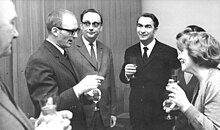| Savez književnika Jugoslavije (Serbo-Croatian) Zveza književnikov Jugoslavije (Slovene) Сојузот на писателите на Југославија (Macedonian) | |
 The First Secretary of the Deutscher Schriftstellerverband Gerhard Henniger and the President of the Association of Writers of Yugoslavia, Aco Šopov signing the cooperation agreement on February 12, 1970 in East Berlin | |
| Formation | 1946 |
|---|---|
| Founded at | Belgrade |
| Dissolved | 1990 |
| Type | writers professional organization |
| Legal status | umbrella organisation |
| Location | |
The Association of Writers of Yugoslavia or the Yugoslav Writer's Union (Serbo-Croatian: Savez književnika Jugoslavije, Slovene: Zveza književnikov Jugoslavije, Macedonian: Сојузот на писателите на Југославија) was an umbrella organisation of 6 of the constituent republics' writers associations in the Socialist Federal Republic of Yugoslavia. The Association coordinated cooperation between its member organizations.[1] From 1965 onwards, the Association was transformed into a coordination body of its members at the time; the Association of Writers of Bosnia and Herzegovina, the Association of Writers of Montenegro, the Croatian Writers' Association, the Association of Writers of Serbia, Association of Writers of Macedonia and the Slovene Writers' Association.[2] Ivo Andrić was unanimously elected as the first president of the Association in 1946.[2]
With progressive decentralisation and confederalisation of Yugoslavia itself, exemplified in the 1974 Yugoslav Constitution, the importance of the federal association became less prominent from 1970s onwards with republican association attaining more central place in literary life of the country.[3]
Following the last Congress in 1985 in Novi Sad association became one of the first federal institutions which experienced paralyzing querals leading to effective and never formally declared dissolution in 1990.[3] The crisis deepened already in 1986 when Serbian republican branch proposed Miodrag Bulatović as the new president of the association's rotating presidency to which Serbian candidate was to be elected at the time.[4] This candidate was rejected by Slovenian, Kosovan, Montenegrin and Croatian branch whose delegates claimed that the candidate was hostile to other Yugoslav nations.[4]
- ^ Branimir Donat (2022). "DRUŠTVO KNJIŽEVNIKA - KNJIŽEVNIČKA DRUŠTVA". Sarajevske Sveske (1). Retrieved 7 August 2022.
- ^ a b Siniša Paunović (1971). Živan Milisavac (ed.). Jugoslovenski književni leksikon [Yugoslav Literary Lexicon]. Novi Sad (SAP Vojvodina, SR Serbia: Matica srpska. pp. 468–469.
- ^ a b Igor Štiks (2015). Nations and Citizens in Yugoslavia and the Post-Yugoslav States: One Hundred Years of Citizenship. Bloomsbury Publishing. p. 96.
- ^ a b Dejan Jović (2003). Jugoslavija: država koja je odumrla. Zagreb: Prometej. pp. 246–249. ISBN 953-6460-32-7.